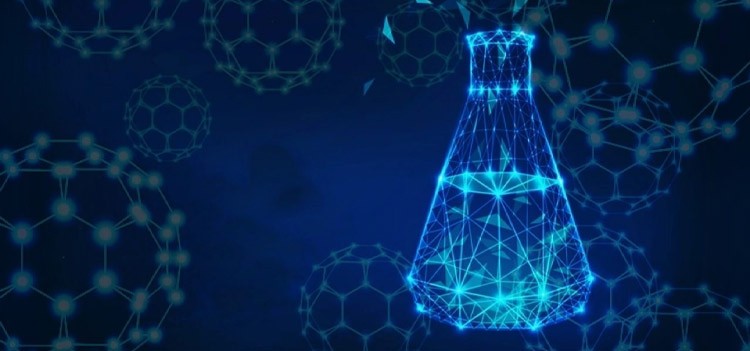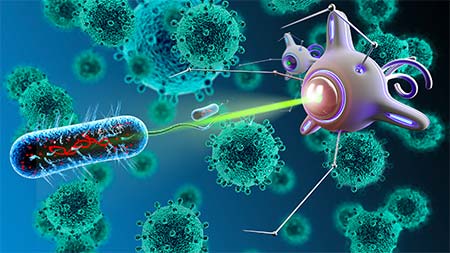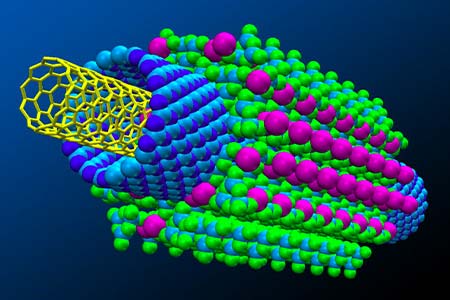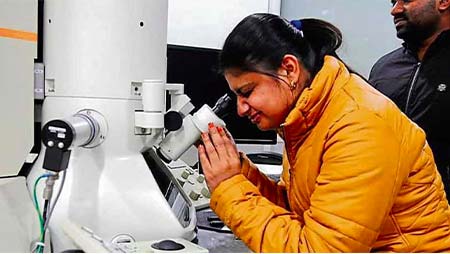Introduction to Nanoscience & Technology
Nanoscience & Technology refers to the study, manipulation and engineering of matter, particles and structures on the nanometre scale. Nanoscience and technology mainly deal with the study of important properties of materials such as electrical, optical, thermal and mechanical properties at nanoscale level. It also determines the way molecules and atoms assemble on nanoscale into larger structures. Nanoscience and technology is typically the study of nanomaterials and nano size components and use them for developing useful products with enhanced properties for the benefit of mankind.
This new born scientific discipline is situated at the interface between physics, chemistry, materials science, microelectronics, biochemistry and biotechnology. So, nanoscience is the combination of various fields of natural science.
Brief about M.Sc Nano Science and Technology
M.Sc Nano Science and technology is a 2-year post graduate programme that is divided into 4 semesters. This field is rapidly growing as a multidisciplinary activity that has enormous economic, social and environmental benefits and offers worldwide employment opportunities. The M. Sc Nanoscience and technology course is interdisciplinary study of various subjects of natural sciences. The students of M.Sc Nanoscience and Technology will be learning the techniques and technologies used in development and study of nanoparticles.
The M.Sc Nanoscience and Technology course equips students with adequate skills to participate in the design, development, characterisation and application of smart and clean materials. The course also enables the students to understand the relationship between artificial and biological systems on a nano-meter scale and its application in various fields. The course develops the understanding of related disciplines such as nano-electronics, nano- medicine, nano-optics, nano-biotechnology, nano-materials, nano-mechanics, nano-particles, etc.
Eligibility for M.Sc Nanoscience and Technology
- Students should have passed their PUC or 10+2 with science background from recognised board
- The students who have passed bachelor’s degree in sciences with subjects of life sciences/biological/medical engineering/medical lab technology with 55% aggregate from recognised university
Admission Procedure for M.Sc Nanoscience & Technology
The interested students can join M.Sc Nanoscience & technology course through two modes (1) Merit admissions (2) Direct admissions
1. Merit Admissions
There are some reputed colleges and universities that conduct entrance exams for the admission to M.Sc Nanoscience & Technology. The students interested to study in such colleges are required to qualify the entrance exams with high-marks. There are limited seats under this mode so entrance exams are conducted to filter out the non-serious candidates and select only deserving candidates. The fees are also nominal for M.Sc Nanoscience & Technology under merit admissions procedures.
2. Direct Admissions
The students also have another option to join M.Sc Nanoscience & Technology course. This is called direct admissions. The student can opt for direct admissions under management quota. The main benefit of direct admissions is that students will get confirmed seats in their desired colleges without any entrance exams. The direct admission students have special privileges where these students are given direct admission without any entrance exams even before the commencement of the academic year. The interested students can contact the educational advisory centres like Galaxy Educational Services for getting direct admissions to M.Sc Nanoscience and Technology courses.
Course Curriculum
The M.Sc Nanoscience and technology students will be studying the following subjects in their course curriculum, they are:
- Mathematical Science
- Quantum Mechanics
- Physical and Chemistry of materials
- Introduction to Nanoscience and technology
- Synthesis of Nanomaterials
- Characterisation techniques for nanomaterials
- Introduction to Biomedicals
- Organic semiconductors and polymers
- Fabrication Techniques
- Nano medicine
- Nanotechnology
- Nano Toxicology
- Nano Electronics
- Nano Chemistry
Future Scope for M.Sc Nanoscience and Technology
Nanoscience and Technology is the new born field and has gained a lot of importance in the last decade. The M.Sc Nanoscience & technology students can easily join many electronics and manufacturing companies in India and even abroad. The demand for Nanoscience specialists is more in abroad when compared to India. They can join PhD programmes and engage in research activities on nanoparticles. They can even join M.Phil to have a deeper understanding of nano-particles. They can join as lecturers in colleges and universities to take up teaching.
Job Roles available after M.Sc Nanoscience & Technology
There are many job roles available for M.Sc Nanoscience & technology students across different organisations basically in manufacturing and production units. Some also join as researchers in research departments of the organisations. Some of the important job roles available are:
- Project Assistant
- Project Manager
- Application Engineer
- Holography and Optics Technician
- Research & Development Engineers
- Optical Engineer
- Manufacturing Engineer
- Optical Assembly Technician
Recruiting Companies Hiring M.Sc Nanoscience & technology students
There are large number of companies that hire M.Sc Nanoscience & technology students, some of the top companies are:
- Samsung
- BASF
- Apeel Science
- Agilent
- Qtech Nanosystems
- Velbionanotech
- Hitachi
- Mitsubishi Electronics
- Adnan Technologies
- E-Spin Nanotech
- Envision Scientific
Concluding Words
The field of Nanoscience and technology is considered as the most emerging field in today’s era. The new innovations and technologies have shifted the focus of many manufacturing giants to invest in research and development of nanoparticles. The field lacks skilled professionals and there is a huge demand for nanoscience students. The surveys predict that nanoscience and technology is the next big thing in the field of technology and is expected to rule the world for coming years.




